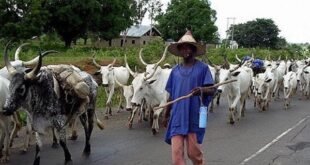Devastating floods that have hit parts of Nigeria have destroyed crops that could have fed 8.5 million people for six months, according to the Food and Agriculture Organization of the United Nations (FAO).
This dire situation has exacerbated the country’s already deteriorating food security situation, with nearly half of Nigeria’s 200 million people living in extreme poverty.
The FAO report said, “Floods that submerged parts of Nigeria at the start of the harvest season have destroyed crops that could have fed 8.5 million people for six months.
He added, “Heavy rains have worsened the already deteriorating food security situation in the country.
“Calculating the exact losses is not yet possible due to the magnitude of the disaster.”
FAO estimates that about 856,000 tonnes of food crops have been lost, based on an average yield of 1.5 tonnes of food grown per hectare on flooded land. This is a major blow to Nigeria’s food production, especially in the 10 states most affected by the floods, including Kaduna, Kano, Jigawa, Nasarawa, Taraba, Bauchi, Zamfara, Yobe, Sokoto and Kebbi.
READ ALSO: Borno floods: DPR rejects proposal to disburse Rp300 billion for victims
Dr. Haruna Mairiga, Secretary of the Jigawa State Emergency Management Agency, confirmed that more than 2,744 hectares of farmland had been washed away by floods in Jigawa State alone.
The floods have also ravaged 12 local government areas, resulting in the death of 21 people and destruction of farmlands and homes. Farmers in the state have lost over N1 billion in agricultural produce and food crops to the floods.
“No less than 2,744 hectares of agricultural land were washed away in the 12 affected areas. From August 1 to 13, 2024, the state was hit by heavy rains that resulted in several floods and killed 21 people and damaged agricultural land and houses,” Mairiga said.
Economic Implications
The impact of the floods on the Nigerian economy is multifaceted. Food prices are already rising at an annual rate of 37.5%, and the damage to crops will only exacerbate this trend. The loss of livestock and the destruction of markets and storage units will also impact the entire food value chain.
Furthermore, the floods have disrupted vital supply chains and services, including schools, health facilities and markets. Telecommunications and electricity networks have also been disrupted in some locations, exacerbating economic hardship.
Humanitarian Crisis
The floods have left hundreds of thousands of people in dire need of aid. The UN reports that more than 414,000 people have been affected, 58 injured and at least 37 killed. The situation is particularly dire in Borno State, where 3 million children have been out of school for extended periods, increasing the risk of early marriage and other protection risks.
Call to Action
As the situation continues to worsen, humanitarian organizations are calling for urgent action. “This is a deepening crisis – in a region where the impacts of climate change are already making food and clean water unaffordable and malnutrition and disease are already rampant among children,” said Duncan Harvey, Save the Children Country Director in Nigeria.
The international community must come together to support Nigeria in this difficult time. FAO’s warning that the floods will worsen the food crisis in a region home to 55 million people already facing hunger due to insecurity and adverse weather conditions must be heeded.
FAO laments deepening food crisis in Nigeria, as floods destroy crops of 8.5 million first appeared on Latest Nigeria News | Headlines from Ripples Nigeria.
 JamzNG Latest News, Gist, Entertainment in Nigeria
JamzNG Latest News, Gist, Entertainment in Nigeria









